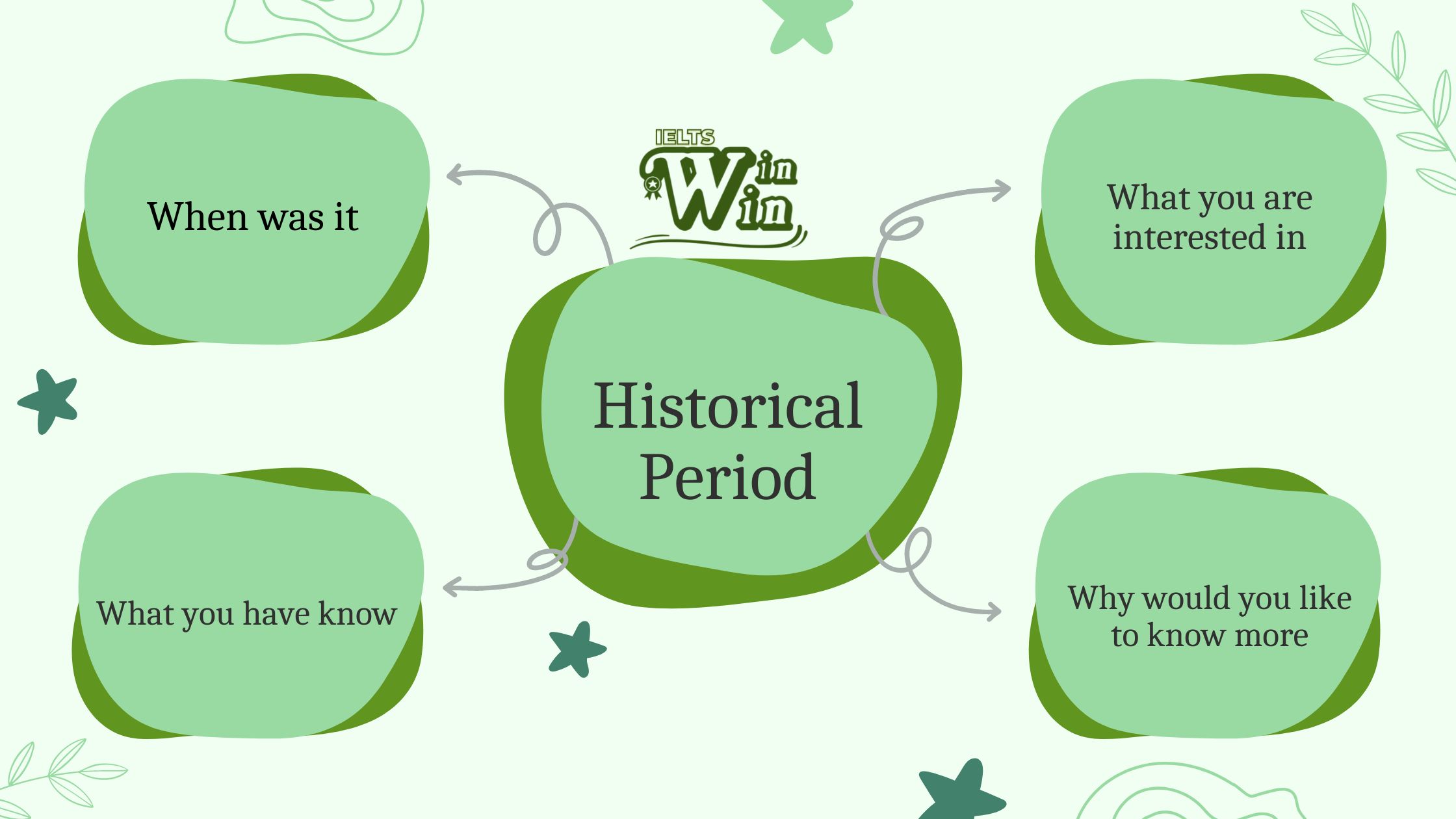✨Part 2: Describe a historical period you would like to know more about.
You should say:
- when it was
- what you are interested in
- what you have known
- and why you would like to know more.
What: This question instantly reminds me of the Industrial Revolution that started around the 18th and 19th centuries in England.
When: I was watching the 2012 Summer Olympics opening ceremony, which was held in London and there was this impressive performance that caught my eye. I didn’t know what that performance was meant to represent so I went on Google and found some really interesting historical information.
How: Turns out the performance was about the Industrial Revolution in England. As far as I know, during Queen Victoria’s reign, London experienced dramatic growth and became a leader in industrialization. Novel machines were invented to replace labour work, and factories mushroomed all around the city, making mass production of goods faster and more efficient. This period witnessed an upsurge in the city's population as many individuals migrated from rural areas in pursuit of work opportunities. I find this era of English history fascinating, as it had a profound impact on the nation's economy and initiated industrialization in numerous other countries.
Why: One aspect that piques my curiosity is the process of creating new technological innovations in the context of limited resources and insufficient availability of materials to build advanced machines suitable for factory work. I yearn to acquire more knowledge about the brilliant minds who contributed to this golden era of England.
- Industrialization /ɪnˌdʌstriəlaɪˈzeɪʃən/ : quá trình chuyển đổi từ nền kinh tế nông nghiệp sang nền kinh tế công nghiệp, với sự phát triển của những nhà máy và các cơ sở sản xuất.
- Labour work /ˈleɪbər wɜːrk/ : công việc lao động, công việc vất vả, đòi hỏi sức lao động và thể lực.
- Mushroomed /ˈmʌʃruːmd/ : tăng lên nhanh chóng và đột ngột, giống như sự phát triển nhanh chóng của nấm mồ.
- An upsurge /ˈʌpsɜːrdʒ/ : một sự gia tăng đột ngột hoặc một sự phát triển mạnh mẽ của một sự vật hoặc một hiện tượng.
- In pursuit of /ɪn pəˈsuːt əv/ : trong quá trình tìm kiếm hoặc theo đuổi điều gì đó.
- Profound impact /prəˈfaʊnd ˈɪmpækt/ : ảnh hưởng sâu sắc và to lớn.
- Piques my curiosity /piːks maɪ ˌkjʊriˈɒsɪti/ : kích thích sự tò mò của tôi.
- Yearn to /jɜːrn tuː/ : mong muốn mạnh mẽ và sâu sắc để làm điều gì đó hoặc có được điều gì đó.
PART 3
✨How is history taught in Vietnam?
History is an essential subject in the Vietnamese education system, so all students in Vietnam are required to study it from primary school until they graduate from high school. However, history lessons are generally taught in a lecture format, with teachers presenting the material and students taking notes. This method of teaching is considered outdated, which can lead to passive learning of history as students only try to memorise timelines and pass exams, especially in high school where history is often considered an elective subject in the final years.
- Essential/ɪˈsenʃl/: rất quan trọng và cần thiết, không thể thiếu được.
- Outdated /aʊtˈdeɪtɪd/ : lỗi thời, đã lạc hậu, không còn phù hợp với thời đại hiện tại.
- Timelines/ˈtaɪmlaɪnz/ : thời gian cụ thể để hoàn thành một công việc hoặc một dự án.
- An elective subject /əˈlektɪv ˈsʌbdʒɪkt/ : môn học tùy chọn trong một chương trình giảng dạy, không bắt buộc phải học.
✨Is there any difference between teaching history through books and movies?
Yes, of course. Teaching history through textbooks alone may not be enough to stimulate students' imagination about the past. However, presenting historical information through movements, special effects, and amazing soundtracks can help students visualise the historical period better and increase their engagement during the lecture. It is also important to note that some historical events in movies may be distorted, as moviemakers may sacrifice accuracy for the sake of entertainment value. So, it is important to strive for a balance of accuracy and engagement when teaching history.
- Stimulate/ˈstɪmjʊleɪt/: kích thích, khuyến khích hoạt động, tăng cường hoạt động của một hệ thống hoặc cơ quan nào đó.
- Visualise/ˈvɪʒuəlaɪz/: tưởng tượng hình ảnh trong đầu một cách rõ ràng và sinh động.
- Distorted /dɪˈstɔːtɪd/: bị méo mó, bị biến dạng, không đúng với sự thật hoặc với hình dạng ban đầu.
- Strive for /straɪv fɔːr/: là nỗ lực, cố gắng để đạt được một mục tiêu hoặc một kết quả tốt hơn.
✨Why are there many children who do not like to learn history?
Well, there could be a few reasons why some children don't enjoy learning history. Firstly, the way of teaching is not engaging and children can hardly connect to the material. Secondly, some children may find history to be too focused on memorization of dates and events, without understanding the context or relevance of those events to their own lives.
- Memorization /ˌmeməraɪˈzeɪʃən/: hành động hoặc quá trình ghi nhớ hoặc học thuộc lòng một kiến thức, một thông tin hoặc một danh sách.
- Relevance/ˈreləvəns/: tính thích hợp, liên quan, có ảnh hưởng đến điều gì đó.
✨Do young people like historical stories in your country?
I'm not entirely sure, but based on recent trends among Vietnamese youngsters, it seems that historical stories are becoming increasingly popular. Historical dramas, movies, and books are widely embraced by Vietnamese teenagers and young adults. With greater access to online resources, they can discover interesting pieces of historical information that were not taught in schools and gain a better appreciation of the country's past events.
- Youngsters /ˈjʌŋstərz/ (IPA): những người trẻ tuổi, thanh niên.
- Embraced by /ɪmˈbreɪst baɪ/ (IPA): chấp nhận hoặc ủng hộ một ý tưởng, một quan điểm hoặc một phong cách nào đó.
✨Do you think history matters in a country’s future development?
History lays a solid foundation for the development of a country. Wars and battles from the past serve as lessons for today's generation by acknowledging the successes and failures of our ancestors. In Vietnam, for instance, our predecessors bravely fought to defend our country from Chinese, French, and American foes. These inspiring battles have taught Vietnamese young generations valuable lessons about perseverance and diligence, which are qualities that can help them in shaping the future of the country.
- Foundation /faʊnˈdeɪʃən/ (IPA): nền tảng, cơ sở, nền móng của một hệ thống, một tổ chức hoặc một công trình.
- Ancestors /ˈænsɪstərz/: tổ tiên, những người đi trước trong gia đình hoặc dòng họ.
- Predecessors /ˈpriːdɪsesərz/ : những người đi trước, tiền nhiệm hoặc người kế vị một chức vụ, một vị trí hoặc một tổ chức.
- Perseverance/ˌpɜːsəˈvɪərəns/ : tính kiên trì, bền bỉ và nỗ lực không ngừng để đạt được mục tiêu.
- Diligence /ˈdɪlɪdʒəns/ : tính cần cù, siêng năng và chăm chỉ trong công việc hoặc học tập.
✨Are there other ways people can learn about history, apart from school? How?
There are various other ways to make learning history more enthralling. To get a sense of the real artefacts and historical events, visiting museums or historical sites is recommended to have a firsthand experience. Also, the domination of technology allows students to easily access freely available historical resources online, however, it is important to double-check the source first for its reliability. Let’s not forget oral history, it’s always more immersive to listen to true historical stories from your grandparents or your great-grandparents, who can provide a personal perspective on past events.
- Enthralling /ɪnˈθrɔːlɪŋ/: là hấp dẫn, cuốn hút, khiến người ta bị thu hút và mê hoặc.
- Artefacts /ˈɑːtɪfækts/: là các đồ vật, hiện vật hoặc tài liệu mang tính lịch sử, văn hóa hoặc khoa học.
- Firsthand/ˈfɜːstˈhænd/: trực tiếp, từ nguồn gốc, được trải nghiệm hoặc chứng kiến bởi chính mình.
- Immersive /ɪˈmɜːsɪv/: đưa người tham gia vào một trải nghiệm sống động và thực tế, khiến họ có cảm giác như đang tham gia vào một thế giới khác.
✨Do you think history will still be a school subject in the future? Why?
History is a subject that has been taught in schools for centuries, and yes, it should continue to be a school subject in the future. It's not the past that is boring, but rather the way it is often taught that can be tedious for many students. The teaching of history must evolve by incorporating technological advancements that allow students to experience historical events from a first-person perspective, or by taking them on more field trips where they can interact with artefacts and gain a deeper sense of their historical significance. Therefore, despite how uninteresting history is being taught, it’s still essential to study it because it allows us to understand and value past events, and use that knowledge to make ongoing contributions to society.
- Tedious /ˈtiːdiəs/: tẻ nhạt, buồn tẻ và mất hứng thú.
- Incorporating /ɪnˈkɔːpəreɪtɪŋ/ : tích hợp, kết hợp hoặc bao gồm một thành phần hoặc một yếu tố khác vào trong một hệ thống hoặc một sản phẩm.
- Technological /ˌteknəˈlɒdʒɪkəl/ : liên quan đến công nghệ, cách thức hoặc thiết bị sử dụng công nghệ.
- Advancements /ədˈvɑːnsmənts/: sự tiến bộ, sự phát triển và cải tiến trong một lĩnh vực hoặc một ngành nghề nào đó.
Xem thêm các bài viết về Speaking Part 2 và 3 ở đây bạn nhé
Đừng ngần ngại để lại thông tin hoặc liên hệ với chúng mình qua địa chỉ sau đây để IELTS WinWin có thể hỗ trợ tốt nhất cho bạn nhé!
Địa chỉ: 118 Nguyễn Xuân Khoát, P. Tân Thành, Q. Tân Phú, TP. Hồ Chí Minh.
Fanpage: IELTS WinWin
Zalo: 0965 439 239 – 085 301 8788
Website: ieltswinwin.com



